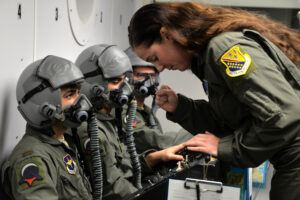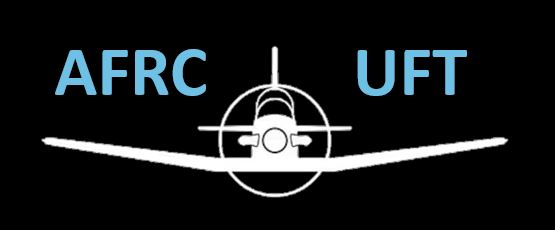2. Eligibility
 2.1. Overview. If you are seeking to fly in the Air Force Reserve, you must meet commissioning, flying, medical and service commitment requirements. Exceptions to policy are granted on a case-by-case basis (see Section 2.5). See below for more information on eligibility requirements.
2.1. Overview. If you are seeking to fly in the Air Force Reserve, you must meet commissioning, flying, medical and service commitment requirements. Exceptions to policy are granted on a case-by-case basis (see Section 2.5). See below for more information on eligibility requirements.
2.2. Commissioning. AFR UFT applicants not already a commissioned officer in the U.S. military must meet commissioning requirements as specified in DAFMAN26-2032.
2.3. Flying Training. AFR UFT applicants must meet flying training eligibility requirements as specified in AFMAN36-2100 and outlined below. See Section 2.5 for information about Exceptions to Policy (ETP).
2.3.1. Age. UFT applicants must not be beyond their 33rd birthday (40th birthday for RPA pilot applicants) as of the date their UFT selection board convenes.
2.3.2. TFCS. UFT applicants must not have more than 8 years of Total Federal Commissioned Service (TFCS) as of the date their UFT selection board convenes.
2.3.3. Morals. UFT applicants must be of sound moral character. An applicant with adverse or reportable information in their personnel or criminal record may require a moral waiver and should notify their recruiter and sponsoring unit (if applicable).
2.3.4. AFOQT. UFT applicants must take the Air Force Officer Qualifying Test (AFOQT). The AFOQT may be taken twice (with 90 days in between), but a waiver from the sponsoring wing commander is required for an applicant to take the test a third time. In any case, the highest score from each subtest will automatically be counted in an overall composite score. For more information about the AFOQT, including minimum required scores, see AFMAN36-2664.
2.3.5. TBAS. UFT applicants applying for pilot or RPA pilot must take the Test of Basic Aviation Skills (TBAS), which measures cognitive and multi-tasking abilities. The TBAS may be taken twice (with 90 days in between). A waiver from the sponsoring wing commander is required for an applicant to take the test a third time. For more information about the TBAS, see AFMAN36-2664.
2.3.6. PCSM. The Pilot Candidate Selection Method (PCSM) is a composite score based on your AFOQT pilot section score, TBAS score and flight time (both fixed-wing and helicopter time). The maximum number of flight hours that will result in the highest possible PCSM score is 60 hours. Pilot and RPA pilot applicants must attain the minimum-required PCSM score of 10. PCSM scores are accessible here. For more information about the PCSM score, see AFMAN36-2664.
2.4. Medical. UFT applicants must meet all medical standards for the rated position to which they are applying as specified in DAFMAN48-123. Applicants may apply to and meet an AFRC UFT selection board prior to completing a flight physical, however all board selectees must be medically certified prior to accession or commencement of training. See Section 2.5 for information about Exceptions to Policy (ETP).
2.4.1. Pilot – IFC1. Undergraduate Pilot Training (UPT) applicants must meet Initial Flying Class 1 (IFC1) standards and pass the Medical Flight Screening (MFS) program prior to beginning flight training. MFS is a subset of a complete initial flight qualification examination that uses standardized medical screening techniques to ensure pilot candidates are in compliance with Air Force medical standards. MFS is only accomplished at the USAF School of Aerospace Medicine (USAFSAM) at Wright Patterson AFB, Ohio. For AFR units and recruiters: Click here for information on how to schedule an IFC1 (download and open with Adobe to view attachments). ROTC detachments should follow ROTC procedures for scheduling flight physicals for cadets.
2.4.2. CSO – IFC1A. Undergraduate Combat Systems Officer Training (UCT) applicants must meet Initial Flying Class 1A standards. IFC1As are accomplished by the sponsoring unit’s Reserve Medical Unit (RMU). ROTC detachments should follow ROTC procedures for scheduling flight physicals for cadets.
2.4.3. RPA – FAA Class III and GBO. Undergraduate RPA Training (URT) applicants must meet FAA Class III and Ground Based Operator (GBO) standards, as well as complete Medical Flight Screening (MFS). Applicants should work with their recruiter and/or sponsoring unit to schedule the appropriate medical exams. ROTC detachments should follow ROTC procedures for scheduling flight physicals for cadets.
2.4.4. ABM – IFC3. Undergraduate Air Battle Manager Training (UABMT) applicants must meet Initial Flying Class 3 (IFC3) standards. Applicants should work with their recruiter and/or sponsoring unit to schedule the appropriate medical exams. ROTC detachments should follow ROTC procedures for scheduling flight physicals for cadets.
2.5. ETP. Applicants not meeting one or more eligibility requirements may seek an Exception to Policy (ETP) in accordance with AFMAN36-2100. An applicant requiring an ETP must be sponsored. The approval authority depends on the type of ETP (see below). Per AFMAN35-2100, an “ETP should only be requested in rare circumstances when a commander can document sustained, exceptional performance and the deviation from policy is minor… Commanders should specifically and explicitly justify why supporting an ETP for an individual, considering a large pool of fully qualified applicants, is in the best interests of the RegAF, AFR or ANG. Only the rare, truly exceptional individual should be endorsed and forwarded through the chain of command for ETP consideration.”
2.5.1. Non-Medical ETP. AFRC/A3 is the approval authority for non-medical ETPs per AFMAN36-2100 section 1.3.5. and memo “Delegations of AFRC/CC Authority” memo dated Nov 2022. Non-medical ETP requests require endorsement by the sponsoring NAF/CC prior to submission to the UFT Selection Board. The sponsoring unit must route an endorsement memorandum (click here for template) via Task Management Tracker (TMT) to the appropriate NAF/CC for endorsement. Recommended routing: SQ/CC > OG/CC > WG/CC > NAF/CC > Requestor. The sponsoring unit should create the TMT tasker so that it returns to the them after NAF/CC endorsement. The sponsoring unit must then submit the full application (including the NAF/CC-endorsed ETP memo) to the UFT Selection Board. The sponsoring unit should not include AFRC/A3 in the TMT routing of any non-medical ETP, since AFRC/A3 will review and approve/deny the ETP request as part of the selection board process. See below for more information about common non-medical ETPs. For information about medical ETPs, see Section 2.5.2.
2.5.1.1. Age. Exceptions to Policy for age are intended for qualified applicants who are slightly outside the age limit (i.e. minor deviation from policy), or, if more than slightly outside the limit, are exceptionally qualified.
2.5.1.2. TFCS. Exceptions to Policy for TFCS are intended for qualified applicants who are slightly outside the TFCS limit (i.e. minor deviation from policy), or, if more than slightly outside the limit, are exceptionally qualified.
2.5.1.3. Moral. Moral ETPs require all court records including final adjudication and a detailed statement from the applicant outlining the offense, any adverse adjudication and any mitigating factors the applicant wants to offer. Work with your sponsoring unit and/or recruiter to ensure all required documentation is provided.
2.5.1.4. Disenrollment from a Commissioning Source. An individual disenrolled from a commissioning source because of lack of aptitude, indifference to training, incompatibility, breach of contract terms, undesirable character traits, or disciplinary reasons may not reenroll in any Air Force officer commissioning program or be appointed to any Air Force component without a waiver from the appropriate nomination authority listed in DAFMAN26-2032, section 5.3. The ETP must be submitted in accordance with DAFMAN26-2032, sections 5.4.8.3 and 7.4.7.
2.5.1.5. Disenrollment from a Military Flying Training Course. An individual disenrolled from a military flying training course may not apply for AFRC UFT without an ETP per with AFMAN36-2100 (section 3.3.2.12).
2.5.2. Medical ETP. AETC/CC is the approval authority for AFRC UFT applicants (AFRC/CC endorsement required) who do not meet service medical accession standards but do meet medical retention standards. This authority is delegated to AETC/CC by SecAF (click here for delegation memo). AF/A1K manages the total force medical ETP process, formally known as the Force Development ETP (FDETP) process. The FDETP process exists to standardize evaluation of medical ETPs for highly competitive Air Force applicants with critical skill sets. It is intended only for exceptionally qualified applicants. For AF/A1K’s most current guidance on how to submit a medical ETP, send an email to [email protected].
2.6. RSC. UFT applicants must be willing to serve in the Air Force Reserve for a minimum number of years as part of a Reserve Service Commitment (RSC). The duration of the RSC depends on the type of training, and is identical to an active duty service commitment: 10 years for UPT and 6 years for UCT, UABMT and URT. If selected for UFT, candidates will sign a RSC contract.

